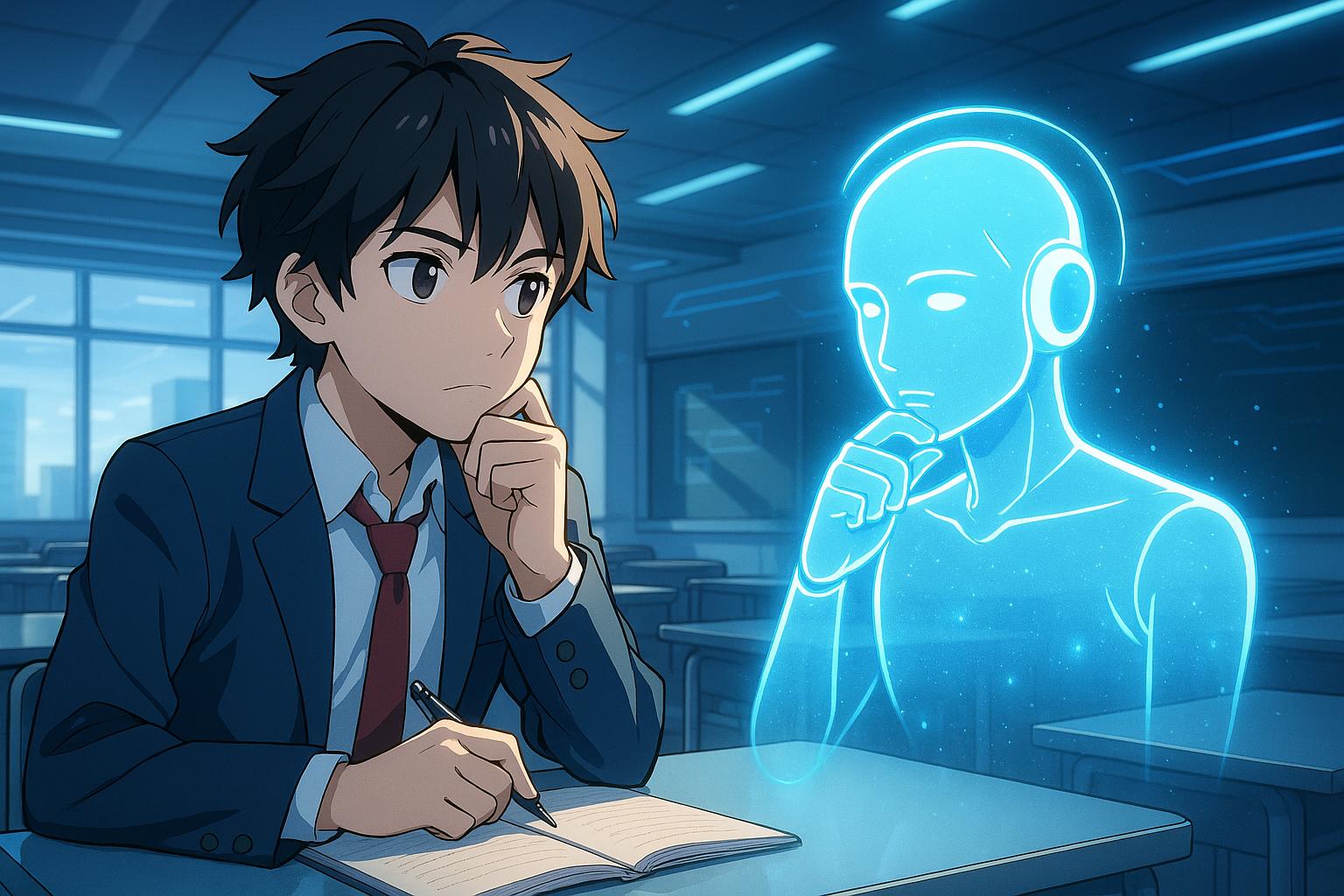As AI tools like ChatGPT become integral to education, experts argue these technologies should be embraced as catalysts for critical thinking and personalised learning, rather than banned or feared. Early exposure and tailored instruction promise to enrich student engagement and prepare them for a digital future.
As generative AI tools increasingly permeate education and training environments, the dialogue surrounding their role in fostering critical thinking has become paramount. The prevailing concern is whether these technologies undermine our ability to think independently. Critics argue that if a student can quickly obtain comprehensive responses from AI systems like ChatGPT, the incentive to engage in self-directed thought diminishes significantly. However, this viewpoint may overlook a deeper truth: AI can act as a catalyst for critical thinking rather than a hindrance.
The ongoing discourse suggests a need to shift from questioning the value of thinking in a technology-augmented landscape to exploring how generative AI can actually enhance cognitive engagement. As observed within educational settings, AI’s transformative potential lies not only in its capability to generate content but also in its ability to personalise learning experiences. AI systems can tailor lessons to suit individual students’ needs, subsequently bridging learning gaps. This bespoke approach empowers teachers to focus on fostering meaningful interactions and cultivating critical analytical skills, ultimately creating an inclusive and engaging classroom environment.
Critics of AI in the classroom often advocate for a ban on tools like ChatGPT, believing that restricting access will protect students from over-reliance on technology. Yet, as discussions reveal, such measures are misguided. The societal integration of AI necessitates a comprehensive understanding of how to engage with these tools responsibly. Students should not only learn to navigate AI technologies but also develop critical thinking and problem-solving skills integral to the modern digital landscape. As highlighted by educational leaders, the goal should not be to sidestep AI but to educate students on its ethical implications and operational use.
Moreover, the recent findings from Common Sense Media indicate a significant number of young children—almost 30%—are already engaging with AI for learning purposes. This early exposure underscores the urgent need to adapt educational strategies that harness AI rather than reject it. By introducing AI tools in formative years, educators can cultivate a generation that masters both critical thinking and technological proficiency. The ongoing push by initiatives such as Estonia’s AI Leap, which aims to provide AI skills training to high school students, reflects a growing recognition of the need for such an educational shift. This initiative seeks to enhance critical thinking and awareness of AI through comprehensive training for both students and teachers.
Within this evolving educational context, it becomes evident that generative AI offers a unique collaborative tool for educators and learners. AI can serve as an “apprentice,” assisting students in brainstorming, refining concepts, and conducting research. While AI has unparalleled access to information, it lacks the nuanced understanding and lived experience that human educators bring to the table. This partnership—where critical thinking remains central—allows learners to develop well-rounded, well-considered arguments, ultimately strengthening their comprehension and engagement.
In this age of AI, educators are well-positioned to leverage these tools not as replacements but as enhancements to the learning process. By giving students the skills to critically assess AI outputs and guide their interactions with technology, educators can ensure that learning outcomes are not only maintained but enriched. The emphasis should be on refining the questions we ask as students—an exercise in critical thought that will serve them in all aspects of their lives.
The emergence of AI has shaken traditional conceptions of learning and teaching, raising critical questions about the future of education. In this new landscape, the challenge lies not in resisting change but in equipping learners to navigate a world where AI is omnipresent. As we face the prospect of an AI-driven era, the imperative is clear: we must cultivate critical thinking skills that not only survive but thrive amid this technological revolution.
Reference Map:
- Paragraph 1 – [1], [2]
- Paragraph 2 – [2], [3]
- Paragraph 3 – [4], [5]
- Paragraph 4 – [6], [7]
- Paragraph 5 – [1], [2]
- Paragraph 6 – [3], [6]
Source: Noah Wire Services
- https://www.fenews.co.uk/exclusive/ai-isnt-the-enemy-of-critical-thinking-it-might-be-the-best-way-to-teach-it/ – Please view link – unable to able to access data
- https://www.ft.com/content/603eb05f-8d67-4b5c-a2ec-be4ffc5bd169 – This letter discusses the transformative potential of AI tools in classrooms, highlighting how AI can assist in drafting essays, thereby encouraging critical analysis and fostering deeper understanding among students. It also emphasizes AI’s role in personalising learning experiences to cater to individual student needs and paces, helping bridge learning gaps. Additionally, the letter notes that AI can handle administrative tasks, allowing teachers to focus more on interactive, meaningful instruction. The author advocates for embracing AI in education to create a more engaging, inclusive, and effective learning environment.
- https://time.com/6246574/schools-shouldnt-ban-access-to-chatgpt/ – This article argues against banning AI tools like ChatGPT in schools, stating that such measures are misguided. It suggests that students need to understand how to navigate and responsibly use AI technologies, as AI is increasingly integrated into daily life. The authors, a journalist and a public health expert, emphasize that banning ChatGPT is a mistake since students must learn critical thinking, problem-solving, and ethical considerations for using such technologies. They propose using ChatGPT in education to engage students with these skills, rather than blocking access altogether.
- https://www.axios.com/2025/03/01/ai-kids-critical-thinking – A recent study by Common Sense Media reveals that nearly 30% of parents of children aged 0 to 8 report their kids have used AI for learning. Despite age restrictions on platforms like ChatGPT, many parents see no issue with their children’s use of AI. The study highlights significant findings, especially among children aged 5 to 8. James P. Steyer, founder and CEO of Common Sense, noted that younger children are at the forefront of an unprecedented digital transformation. This is the fifth year Common Sense Media has published its report on media use in children aged 0 to 8, but the first time addressing AI specifically.
- https://time.com/7012801/kristen-dicerbo/ – Despite high expectations, educational technology has generally not succeeded in significantly improving or democratizing education. Kristen DiCerbo, Khan Academy’s Chief Learning Officer, believes AI could be different, specifically with their AI tool ‘Khanmigo.’ Khanmigo functions as a tutor, providing personalized support to students across various subjects and aiding teachers with lesson planning and data analysis. Partnered with Microsoft, Khan Academy offers Khanmigo for Teachers for free in 49 English-speaking countries. DiCerbo’s goal is to enhance the learning of at least 4 million students by 30% within five years. Although results from pilot programs reveal some challenges, such as students struggling to ask questions, DiCerbo is optimistic about AI’s potential to revolutionize education. Additionally, she has helped develop guidelines for AI and EdTech to ensure their safe and responsible use.
- https://www.ft.com/content/897c43a1-e366-415e-9472-4607604aa483 – Estonia has launched AI Leap, an initiative to teach AI skills to high school students, in collaboration with OpenAI and Anthropic. Starting in September, 20,000 students aged 16-17 will have free access to AI learning tools, and 3,000 teachers are beginning AI training workshops. The initiative aims to expand to vocational schools and possibly younger students next year, adding another 38,000 students and 2,000 teachers. Estonia’s President Alar Karis emphasized that the initiative is designed not to replace teachers but to enhance critical thinking and awareness of AI. The government is in advanced talks with tech companies to use their AI tools for free. The initiative, with an initial budget of €3.2mn, aims to innovate education and address the digital divide by providing free computers to students in need. The goal is to prepare students for AI’s role in the future job market and to combat disinformation.
- https://apnews.com/article/ff1f51379b3861978efb0c1334a2a953 – Artificial Intelligence (AI) is significantly aiding students with disabilities, providing assistive technology to support individuals like Makenzie Gilkison, a dyslexic student, in academic tasks. AI-powered tools such as chatbots and word prediction programs are helping students keep pace with classmates, enriching their learning experiences. Schools are prioritizing the integration of AI for students with disabilities, in line with mandates from the U.S. Education Department and new rules from the Department of Justice, which require accessibility in educational tools. AI helps students with various impairments execute tasks effortlessly, but there’s concern that overreliance on AI might impede the actual learning process. Despite challenges like accessibility and ethical considerations, AI holds promise in leveling the academic playing field. The U.S. National Science Foundation is funding research to improve AI tools for children with speech and language difficulties. Effective vetting of educational technology by schools can ensure both accessibility and practicality, aiming to enhance learning outcomes for all students, especially those with disabilities.













